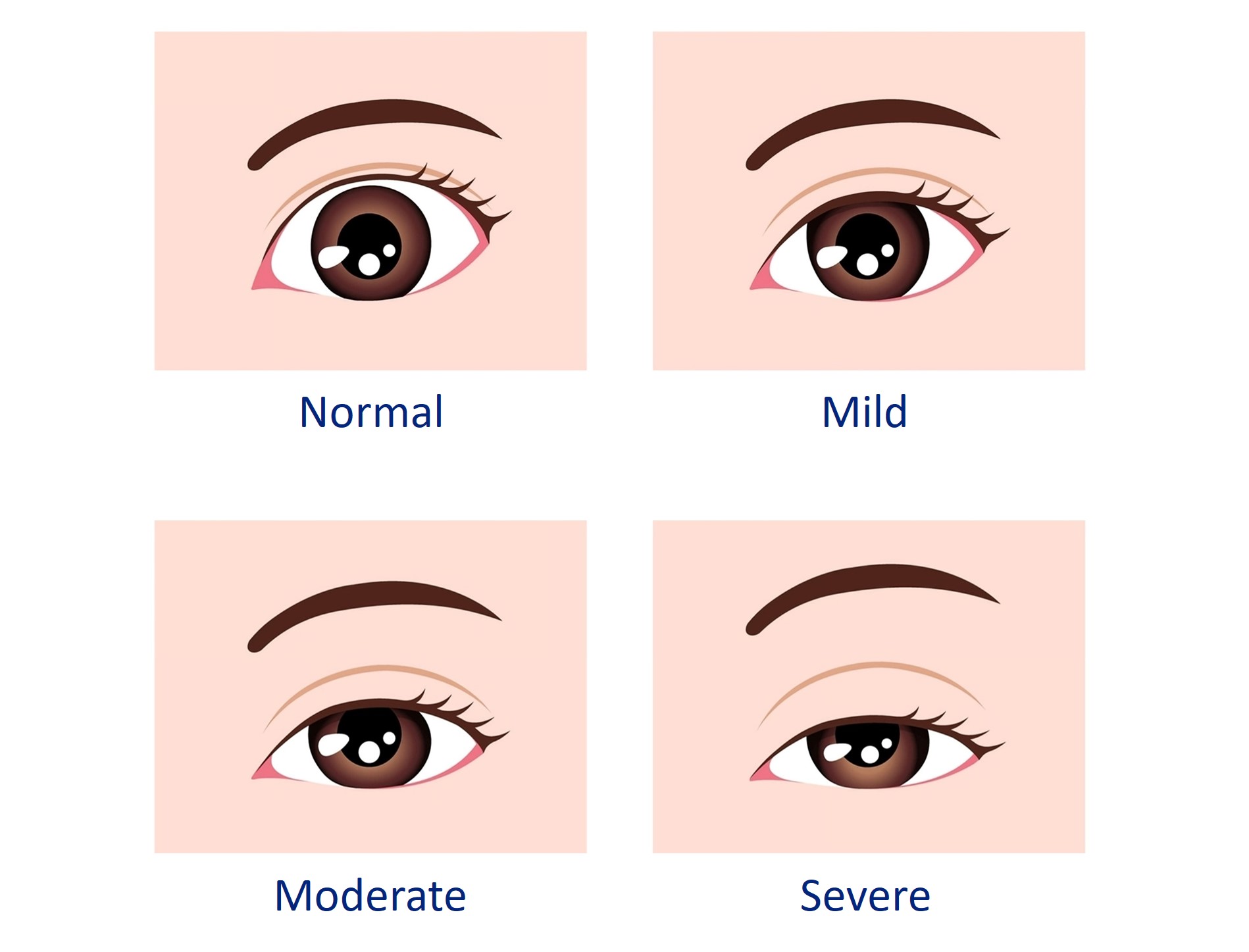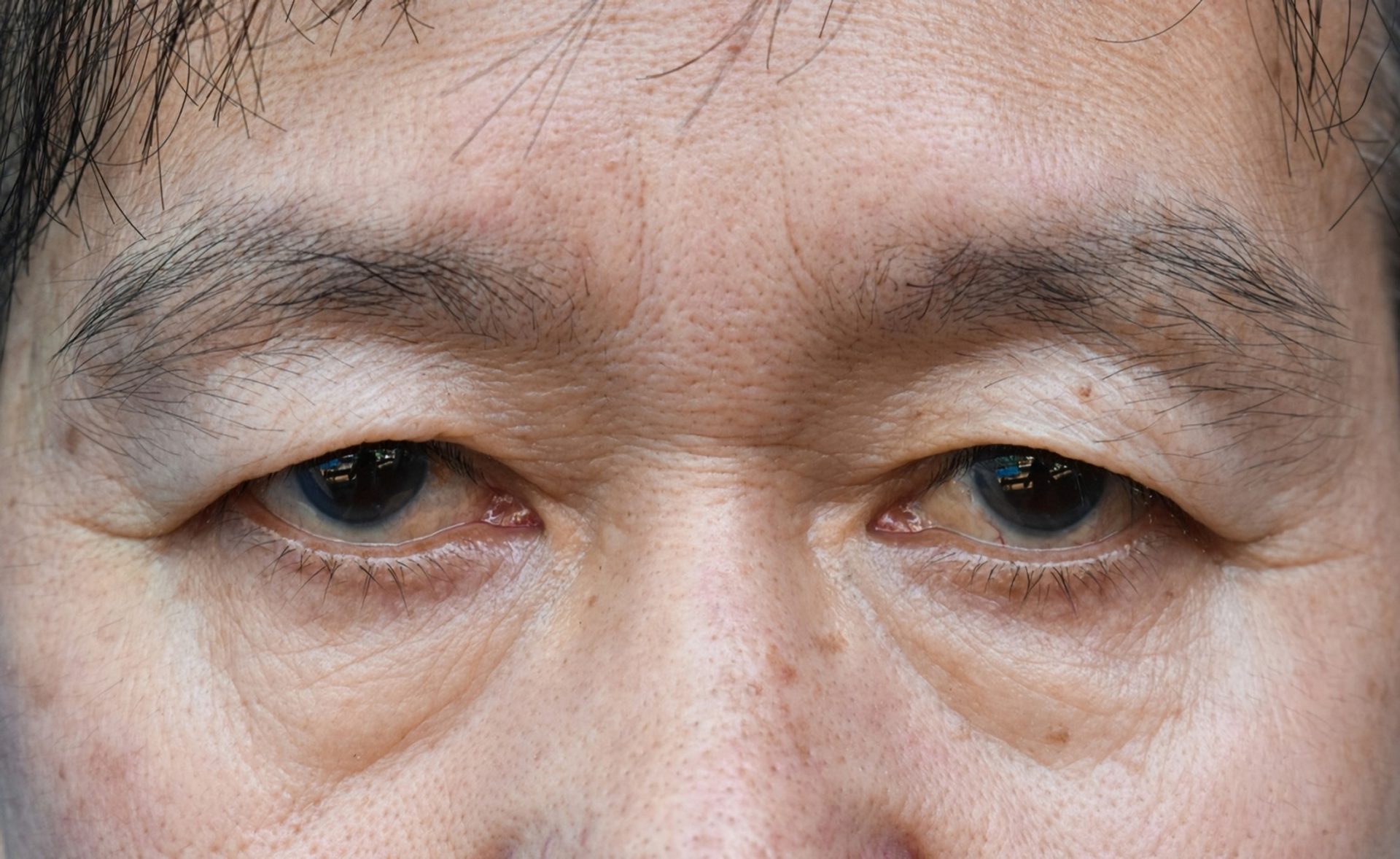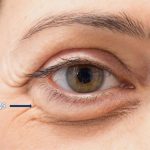Ptosis, also known as blepharoptosis, is a medical condition in which there is a drooping or falling of the upper eyelid. Some people develop this condition during the course of their lives while others are born with it.
Although ptosis does not affect your physical health except that of vision problems in severe cases, it make the person look dull. It is because eyelids play an important role in facial impressions, that’s why even if your eyelids hang only slightly, it makes you look sleepy and tired.
If you feel that your eyes are droopy, you should consider undergoing ptosis surgery. This article is a complete guide to ptosis surgery in Singapore.
What Are Different Types Of Ptosis?

Ptosis is usually documented using Marginal Reflex Distance (MRD), and can be mild, moderate, or severe;
- Mild Ptosis (2mm of droop)
- Moderate Ptosis (3mm of droop)
- Severe Ptosis (4mm or more)
What Are The Causes Of Droopy Eyelids?
Our eyelids contain levator muscles which elevate them and help in opening our eyes. Any abnormality in the structure, function, or nerve supply of levator muscles can lead to drooping of the eyelids.
Many people develop ptosis during their lives due to various reasons, but some are born with it. Therefore, the causes of ptosis can be broadly classified into congenital and acquired ones;

Congenital Causes
Congenital ptosis is more common in children and makes 10% of the total incidence of droopy eyelids.[1] It is present at birth and usually affects one eye. It occurs due to some genetic conditions characterized by dysfunctional levator muscles. The child is unable to lift his or her upper eyelid properly. [2]

Acquired Causes
Ptosis can be acquired due to one of the following causes;
- Age-related / Aponeurotic / Involutional Ptosis – As one ages, the levator muscles become weak, and there is loosening of the levator aponeurosis. It is the most common (60%) cause of ptosis. [1]
- Trauma – Any physical or chemical injury (neurotoxins like snake venom, Botox, etc) to the levator muscles or their nerve supply can cause ptosis.
- Infections – Ptosis can also occur due to the infection of the upper eyelid.
- Neurological problem – Nerves arising from the brain control the functions of eye muscles. Therefore, injury of the brain or peripheral nerves, for instance, cerebrovascular accidents, etc, can lead to drooping of upper eyelids. 11% of ptosis occurs due to neurological causes.
- Tumor – Tumor of the eyelids can also cause droopy eyelids.
- Iatrogenic – Ptosis can also develop after undergoing an eye procedure, like eye filler injection, done by an inexperienced doctor.
Other Causes
Other medical conditions which can lead to ptosis include;
- Diabetes
- Neuromuscular disorders (e.g. myasthenia gravis) – etc
What Are The Problems Of Having Droopy Eyelids?
If you have droopy eyelids, you may face the following problems;
Old And Weary Look
Droopy eyelids make you look tired and older than you are.
Tilted Head Posture
As the eyes do not open fully due to droopy eyelids, it blocks the vision. To compensate for that and to get a better vision, you have to tilt your head back.
Vision Problems
Droopy eyelids not only reduce the visual field but also cause many other eye problems including;
- Amblyopia (reduced vision in one eye)
- Astigmatism (irregular curvature of the cornea or lens leading to blurred or distorted vision)
- Misaligned eyes or strabismus [3]
Difficulty In Doing Routine Activities
Patients may face difficulty;
- Walking
- Reading
- Driving
- Watching TV – etc
Are The Results Permanent?
In most cases, the results of ptosis correction surgery are permanent. However, 10% of the patients may complain of a redeveloped ptosis again in the future. In such cases, revision surgery will be required.
Are There Any Risks Or Side Effects Associated With Ptosis Surgery?
Like any other surgery, ptosis surgery is associated with some risks and side effects. These include;
- Bleeding
- Swelling
- Infection
- Over-correction (eyelid is excessively lifted that you are unable to close your eye fully)
- Scarring
- Breakage or loosening of suture – etc
However, if the surgery is performed by a skilled surgeon and proper care is taken after the treatment, the risks of side effects are minimal.
What Is The Cost Of Ptosis Surgery Treatment In Singapore?
The cost of ptosis surgery in Singapore varies from $5000 to $16,000. The total price depends upon the following factors;
- Type or technique of ptosis surgery used
- Severity of ptosis
- Skills and experience of the surgeon
- Anaesthesia
- Operation room charges
- Instruments and consumables used during surgery
- Post-treatment medications
- Follow-ups – etc
How To Choose A Good Surgeon For Ptosis Treatment In Singapore?
Like said earlier, a ptosis surgery done by an experienced and skilled surgeon not only minimizes the risks of side effects but also ensures desirable results. The question arises, “How can I find such a good surgeon for my ptosis surgery in Singapore?”
Here are a few tips to find a good surgeon in Singapore;
- Ask from people who have undergone a ptosis surgery.
- Get a referral from a doctor because he/she can better recommend a reputable plastic surgeon.
- Ask the surgeon about his years of practice or experience.
- Evaluate the skills of the surgeon by asking for the before and after pictures of a case recently done by him/her.
Can Ptosis Be Corrected With Non-Surgical Methods?
So far, surgery is the best option to rectify ptosis as it nips the problem in the bud. Droopy eyelids can be permanently corrected either by improving or substituting the levator muscle functions, and that can only be done by surgery as discussed below.
Non-invasive and non-surgical options are available but it is rarely done and has temporary effects. There are special eye drops that can briefly lift the Muller’s muscle of the eye and makes your eyes look bigger. These drops are used in patients with special cases, or during photography to enhance the aesthetic appearance of the eyes.
These drops work for only a short time. The only meaningful, permanent, and effective treatment for ptosis is surgery.
Bottom Line
Ptosis is a medical condition in which there is drooping of eyelids. It not only makes you look tired and sleepy but may also cause vision and postural problems. There are various congenital and acquired causes. Surgery is the only best option to treat it and there are several different techniques of doing it. The common ones include the frontalis suspension technique, incisional, and non-incisional eyelid correction.
About Dream Aesthetics and Plastic Surgery
Bespoke surgical for cosmetic or medical reasons is what Dream covers to bring out the beauty in every individual. Going beyond the aesthetics and working on physical anomalies are what we value the most in leading our patients to cherish self-improvement and confident lifestyles.
Derived from Associate Professor Vincent Yeow’s long-standing experience performing plastic surgery in Singapore, our treatment plans deliver physical remodelling in our patients’ favour. One of the notable remodellings is droopy eyelid correction. The ptosis surgery used for treatment eventually fixes drooping eyelids, improves vision and enhances appearance.
Most importantly, as a trustworthy plastic surgery and aesthetic clinic, we treasure positive and natural outcomes for each individual. We will ensure to deliver the beauty refinement of your dream without compromising your safety and privacy.







